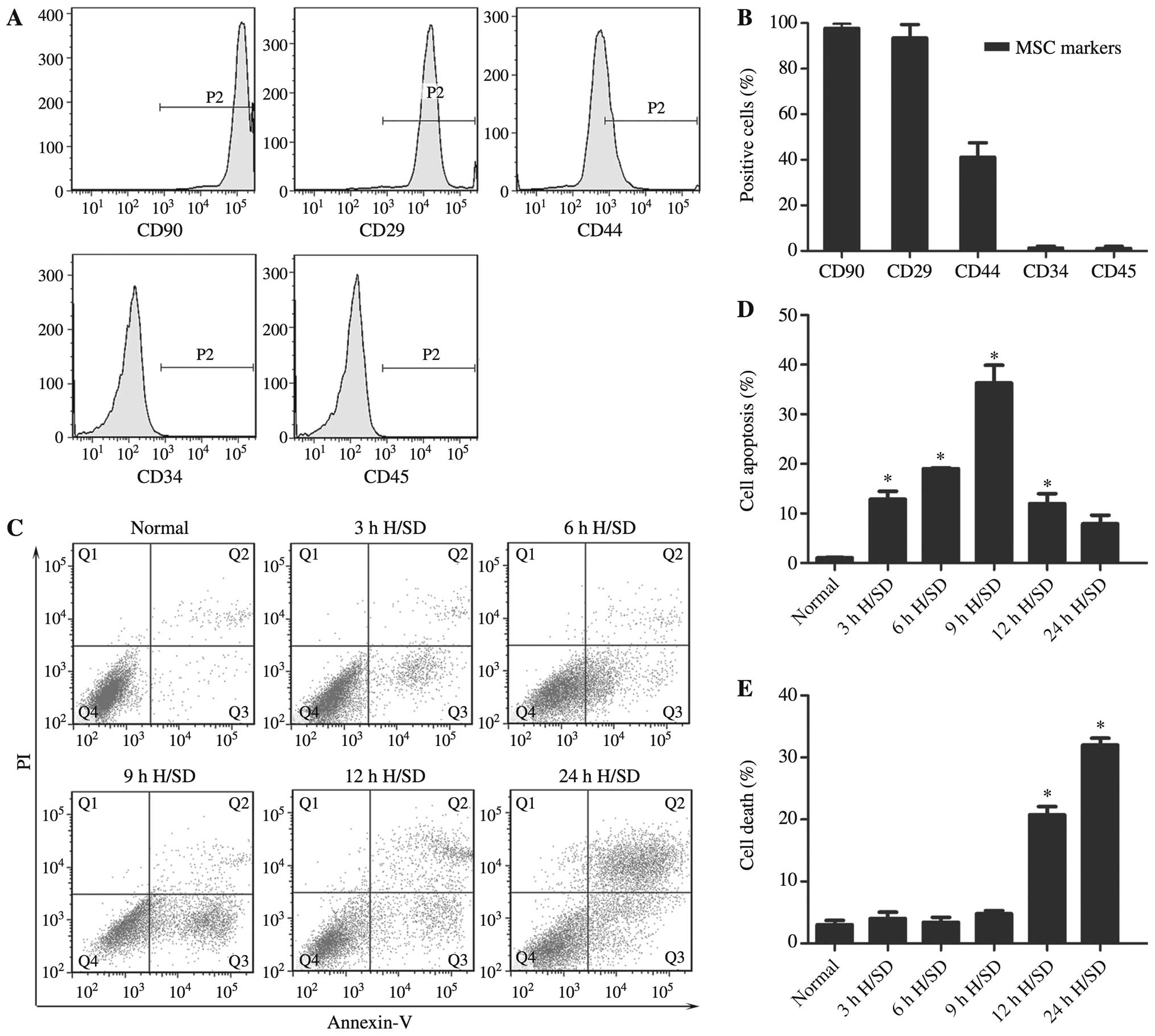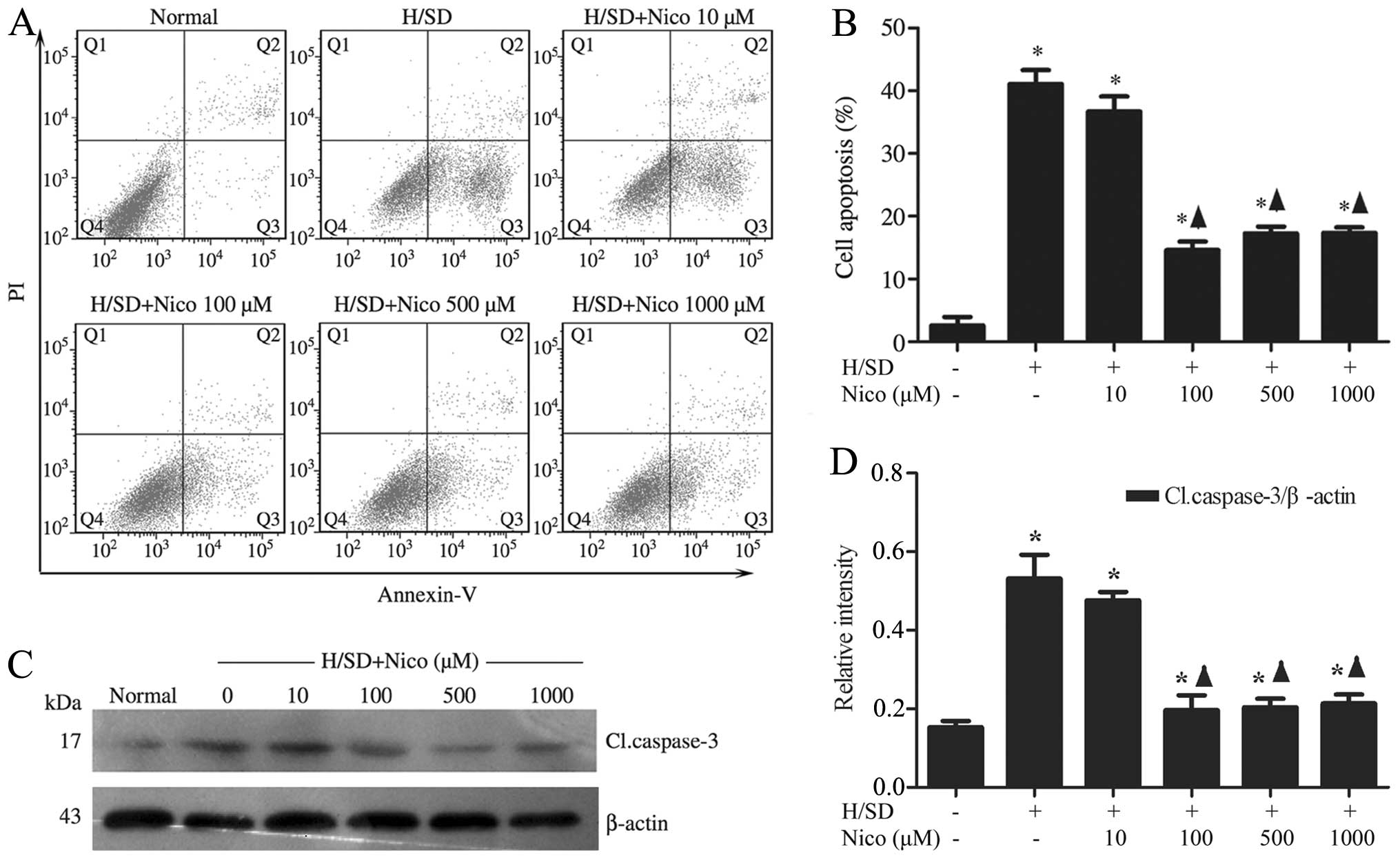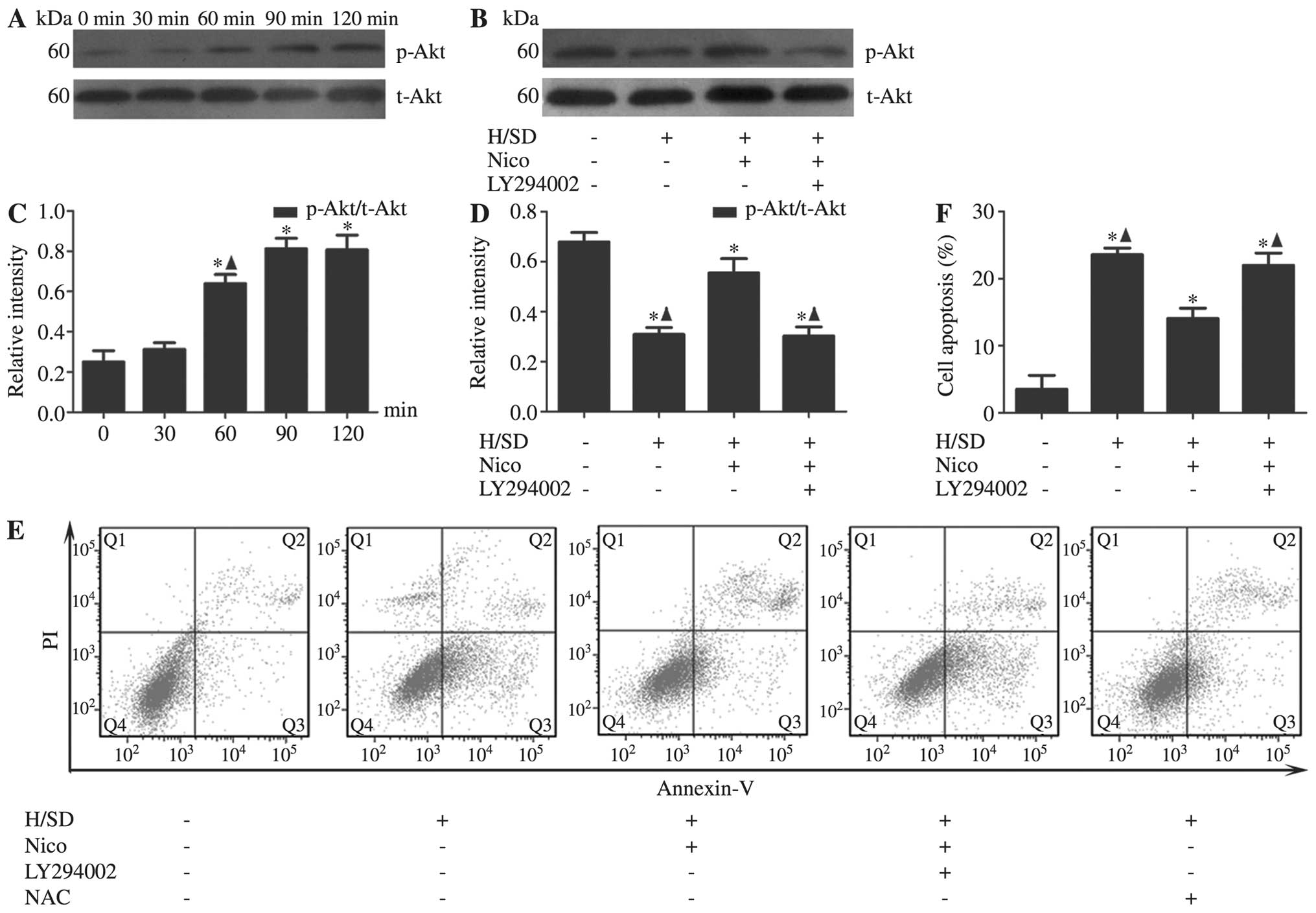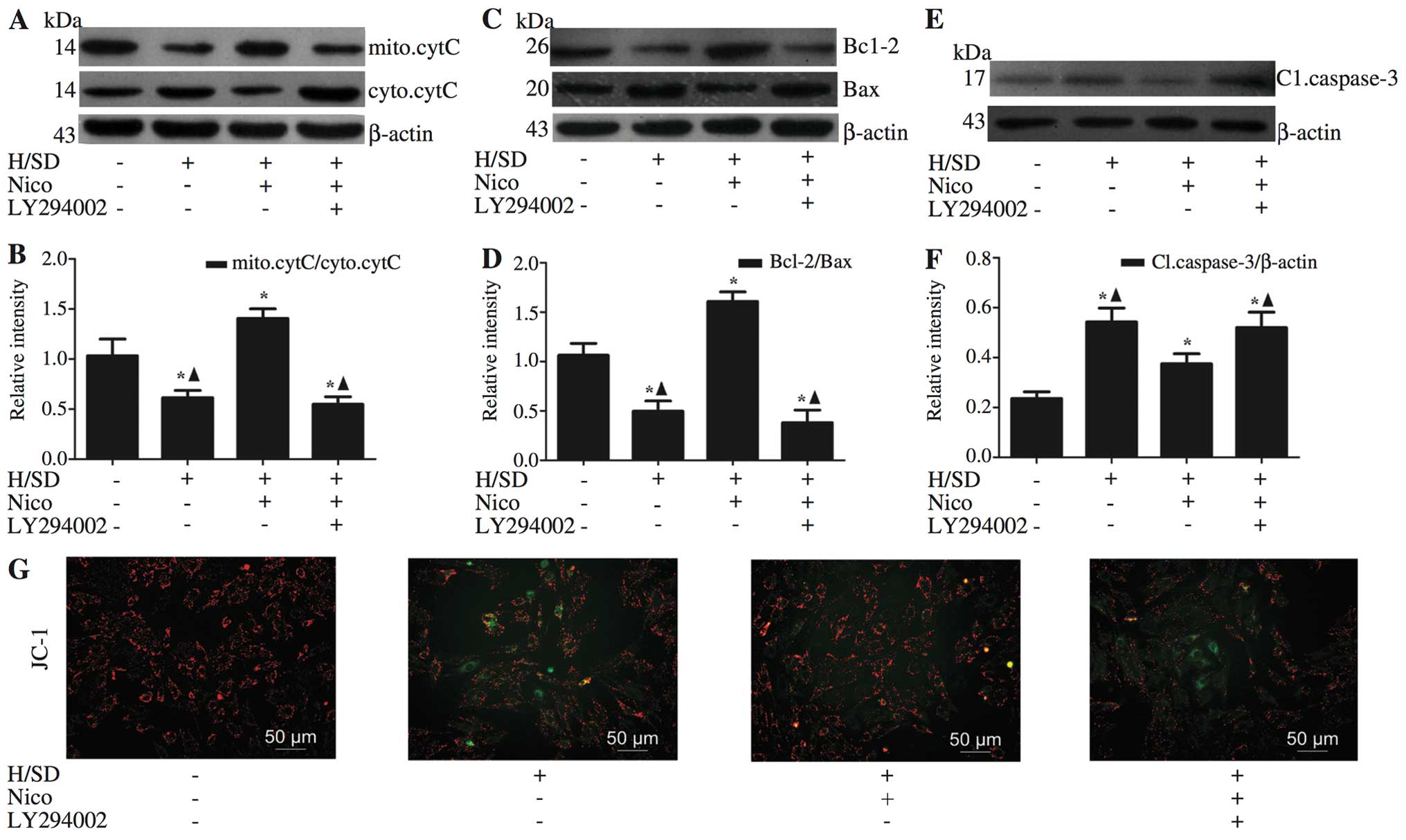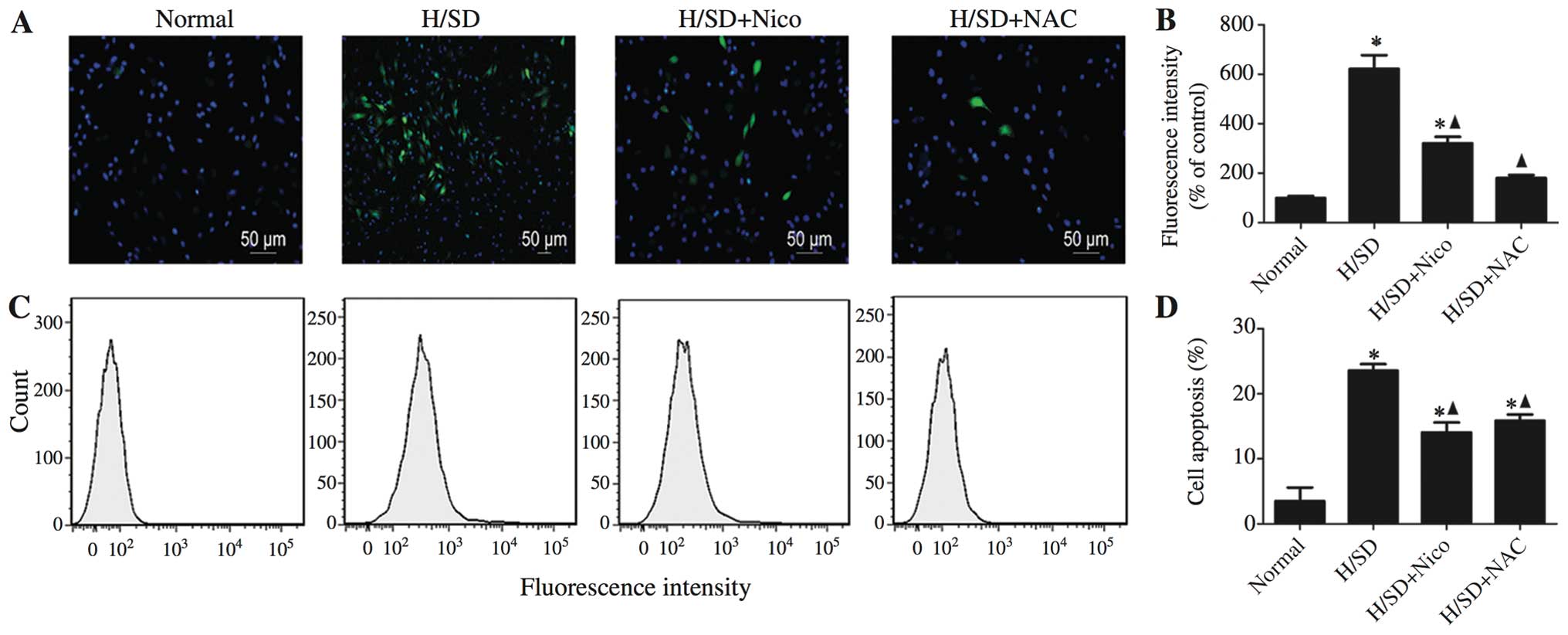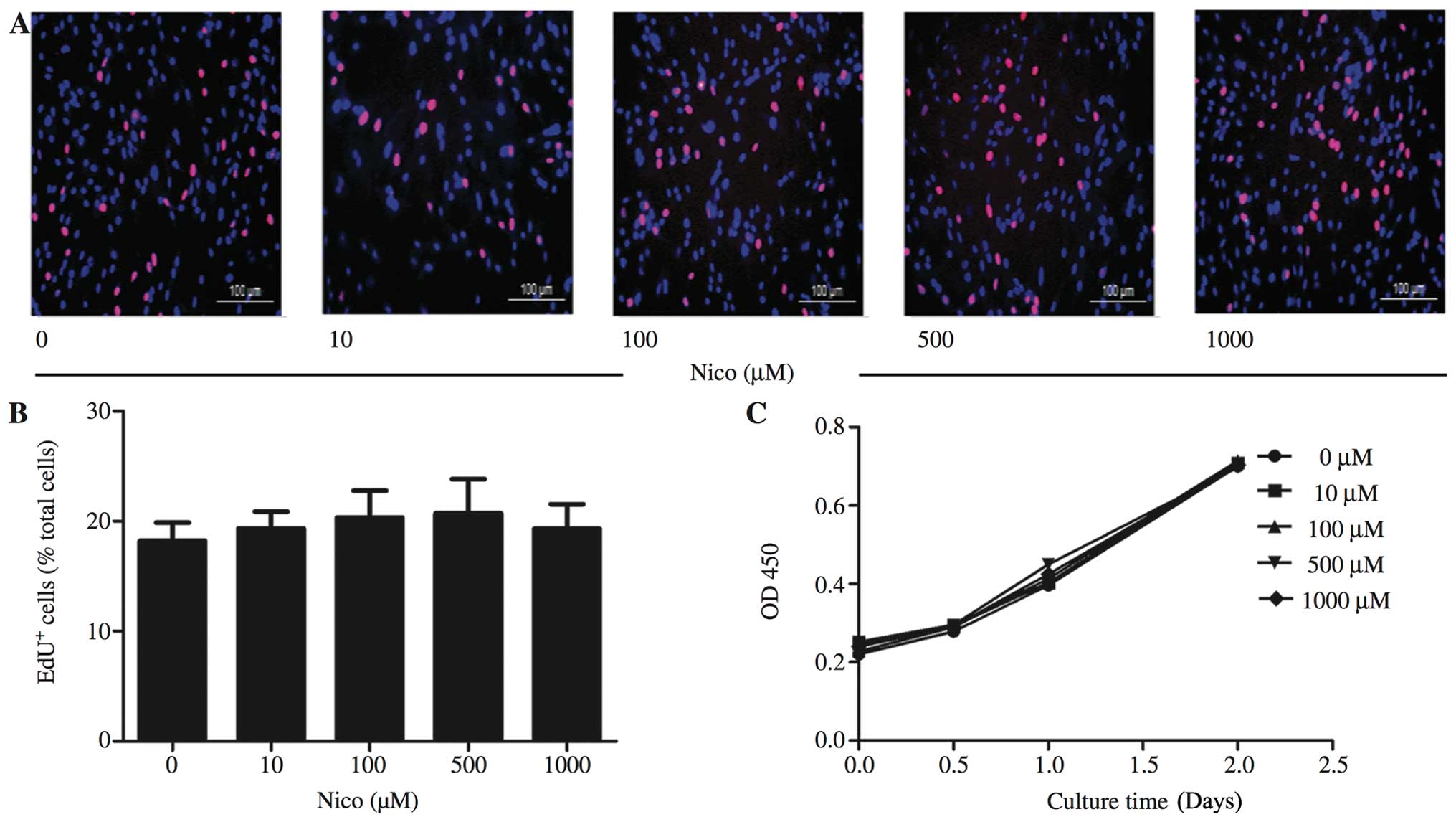|
1
|
Moran AE, Forouzanfar MH, Roth GA, et al:
Temporal trends in ischemic heart disease mortality in 21 world
regions, 1980 to 2010: the Global Burden of Disease 2010 study.
Circulation. 129:1483–1492. 2014. View Article : Google Scholar : PubMed/NCBI
|
|
2
|
Quevedo HC, Hatzistergos KE, Oskouei BN,
et al: Allogeneic mesenchymal stem cells restore cardiac function
in chronic ischemic cardiomyopathy via trilineage differentiating
capacity. Proc Natl Acad Sci USA. 106:14022–14027. 2009. View Article : Google Scholar : PubMed/NCBI
|
|
3
|
Karantalis V, DiFede DL, Gerstenblith G,
et al: Autologous mesenchymal stem cells produce concordant
improvements in regional function, tissue perfusion, and fibrotic
burden when administered to patients undergoing coronary artery
bypass grafting: The Prospective Randomized Study of Mesenchymal
Stem Cell Therapy in Patients Undergoing Cardiac Surgery
(PROMETHEUS) trial. Circ Res. 114:1302–1310. 2014. View Article : Google Scholar : PubMed/NCBI
|
|
4
|
Toma C, Pittenger MF, Cahill KS, Byrne BJ
and Kessler PD: Human mesenchymal stem cells differentiate to a
cardiomyocyte phenotype in the adult murine heart. Circulation.
105:93–98. 2002. View Article : Google Scholar : PubMed/NCBI
|
|
5
|
Pagani FD, DerSimonian H, Zawadzka A, et
al: Autologous skeletal myoblasts transplanted to ischemia-damaged
myocardium in humans. Histological analysis of cell survival and
differentiation. J Am Coll Cardiol. 41:879–888. 2003. View Article : Google Scholar : PubMed/NCBI
|
|
6
|
Zhu W, Chen J, Cong X, Hu S and Chen X:
Hypoxia and serum deprivation-induced apoptosis in mesenchymal stem
cells. Stem Cells. 24:416–425. 2006. View Article : Google Scholar
|
|
7
|
Nichols CG: KATP channels as
molecular sensors of cellular metabolism. Nature. 440:470–476.
2006. View Article : Google Scholar : PubMed/NCBI
|
|
8
|
Costa AD, Quinlan CL, Andrukhiv A, West
IC, Jabůrek M and Garlid KD: The direct physiological effects of
mitoK(ATP) opening on heart mitochondria. Am J Physiol Heart Circ
Physio. 290:H406–H415. 2006. View Article : Google Scholar
|
|
9
|
Yamada M: Mitochondrial ATP-sensitive
K+ channels, protectors of the heart. J Physiol.
588:283–286. 2010. View Article : Google Scholar : PubMed/NCBI
|
|
10
|
Barajas-Martinez H, Hu D, Ferrer T, et al:
Molecular genetic and functional association of Brugada and early
repolarization syndromes with S422L missense mutation in KCNJ8.
Heart Rhythm. 9:548–555. 2012. View Article : Google Scholar :
|
|
11
|
van Bon BW, Gilissen C, Grange DK, et al:
Cantú syndrome is caused by mutations in ABCC9. Am J Hum Genet.
90:1094–1101. 2012. View Article : Google Scholar : PubMed/NCBI
|
|
12
|
Harakalova M, van Harssel JJ, Terhal PA,
et al: Dominant missense mutations in ABCC9 cause Cantu syndrome.
Nat Genet. 44:793–796. 2012. View
Article : Google Scholar : PubMed/NCBI
|
|
13
|
Miura T and Miki T: ATP-sensitive
K+ channel openers: old drugs with new clinical benefits
for the heart. Curr Vasc Pharmacol. 1:251–258. 2003. View Article : Google Scholar
|
|
14
|
Akao M, Teshima Y and Marban E:
Antiapoptotic effect of nicorandil mediated by mitochondrial
atp-sensitive potassium channels in cultured cardiac myocytes. J Am
Coll Cardiol. 40:803–810. 2002. View Article : Google Scholar : PubMed/NCBI
|
|
15
|
Kim JH, Jeong MH, Yun KH, et al:
Myocardial protective effects of nicorandil during percutaneous
coronary intervention in patients with unstable angina. Circ J.
69:306–310. 2005. View Article : Google Scholar : PubMed/NCBI
|
|
16
|
Tsuchida A, Miura T, Tanno M, et al:
Infarct size limitation by nicorandil: roles of mitochondrial
K(ATP) channels, sarcolemmal K(ATP) channels, and protein kinase C.
J Am Coll Cardiol. 40:1523–1530. 2002. View Article : Google Scholar : PubMed/NCBI
|
|
17
|
Iwakura K: Modulation of individual
susceptibility to the no-reflow phenomenon after acute myocardial
infarction. Curr Pharm Des. 19:4519–4528. 2013. View Article : Google Scholar
|
|
18
|
Izumiya Y, Kojima S, Kojima S, et al:
Long-term use of oral nicorandil stabilizes coronary plaque in
patients with stable angina pectoris. Atherosclerosis. 214:415–421.
2011. View Article : Google Scholar
|
|
19
|
Lee TM, Lin MS, Tsai CH and Chang NC:
Effect of ischaemic preconditioning on regional release of
inflammatory markers. Clin Sci (Lond). 109:267–276. 2005.
View Article : Google Scholar
|
|
20
|
Zhao AP, Dong YF, Liu W, Gu J and Sun XL:
Nicorandil inhibits inflammasome activation and Toll-like
receptor-4 signal transduction to protect against oxygen-glucose
deprivation-induced inflammation in BV-2 cells. CNS Neurosci Ther.
20:147–153. 2014. View Article : Google Scholar
|
|
21
|
Hou M, Cui J, Liu J, et al:
Angiopoietin-like 4 confers resistance to hypoxia/serum
deprivation-induced apoptosis through PI3K/Akt and ERK1/2 signaling
pathways in mesenchymal stem cells. PLoS One. 9:e858082014.
View Article : Google Scholar : PubMed/NCBI
|
|
22
|
Zhang Q, Yang YJ, Wang H, et al: Autophagy
activation: a novel mechanism of atorvastatin to protect
mesenchymal stem cells from hypoxia and serum deprivation via
AMP-activated protein kinase/mammalian target of rapamycin pathway.
Stem Cells Dev. 21:1321–1332. 2012. View Article : Google Scholar : PubMed/NCBI
|
|
23
|
Gottlieb E, Armour SM, Harris MH and
Thompson CB: Mitochondrial membrane potential regulates matrix
configuration and cytochrome c release during apoptosis. Cell Death
Differ. 10:709–717. 2003. View Article : Google Scholar : PubMed/NCBI
|
|
24
|
Garrido C, Galluzzi L, Brunet M, Puig PE,
Didelot C and Kroemer G: Mechanisms of cytochrome c release from
mitochondria. Cell Death Differ. 13:1423–1433. 2006. View Article : Google Scholar : PubMed/NCBI
|
|
25
|
Ghavami S, Hashemi M, Ande SR, et al:
Apoptosis and cancer: mutations within caspase genes. J Med Genet.
46:497–510. 2009. View Article : Google Scholar : PubMed/NCBI
|
|
26
|
Kanwar JR, Kamalapuram SK and Kanwar RK:
Survivin signaling in clinical oncology: a multifaceted dragon. Med
Res Rev. 33:765–789. 2013. View Article : Google Scholar
|
|
27
|
Frenette PS, Pinho S, Lucas D and
Scheiermann C: Mesenchymal stem cell: keystone of the hematopoietic
stem cell niche and a stepping-stone for regenerative medicine.
Annu Rev Immunol. 31:285–316. 2013. View Article : Google Scholar : PubMed/NCBI
|
|
28
|
Ye L, Zhang P, Duval S, Su L, Xiong Q and
Zhang J: Thymosin β4 increases the potency of transplanted
mesenchymal stem cells for myocardial repair. Circulation.
128(Suppl 1): S32–S41. 2013. View Article : Google Scholar : PubMed/NCBI
|
|
29
|
Clifford DM, Fisher SA, Brunskill SJ, et
al: Stem cell treatment for acute myocardial infarction. Cochrane
Database Syst Rev. 2:CD0065362012.PubMed/NCBI
|
|
30
|
Zhang Z, Li S, Cui M, et al: Rosuvastatin
enhances the therapeutic efficacy of adipose-derived mesenchymal
stem cells for myocardial infarction via PI3K/Akt and MEK/ERK
pathways. Basic Res Cardiol. 108:3332013. View Article : Google Scholar : PubMed/NCBI
|
|
31
|
Deuse T, Peter C, Fedak PW, et al:
Hepatocyte growth factor or vascular endothelial growth factor gene
transfer maximizes mesenchymal stem cell-based myocardial salvage
after acute myocardial infarction. Circulation. 120(Suppl 11):
S247–S254. 2009. View Article : Google Scholar : PubMed/NCBI
|
|
32
|
Afzal MR, Haider HK, Idris NM, Jiang S,
Ahmed RP and Ashraf M: Preconditioning promotes survival and
angiomyogenic potential of mesenchymal stem cells in the infarcted
heart via NF-kappaB signaling. Antioxid Redox Signal. 12:693–702.
2010. View Article : Google Scholar :
|
|
33
|
Suzuki Y, Kim HW, Ashraf M and Haider H:
Diazoxide potentiates mesenchymal stem cell survival via
NF-kappaB-dependent miR-146a expression by targeting Fas. Am J
Physiol Heart Circ Physiol. 299:H1077–H1082. 2010. View Article : Google Scholar : PubMed/NCBI
|
|
34
|
Mangi AA, Noiseux N, Kong D, et al:
Mesenchymal stem cells modified with Akt prevent remodeling and
restore performance of infarcted hearts. Nat Med. 9:1195–1201.
2003. View Article : Google Scholar : PubMed/NCBI
|
|
35
|
Yee C, Yang W and Hekimi S: The intrinsic
apoptosis pathway mediates the pro-longevity response to
mitochondrial ROS in C. elegans. Cell. 157:897–909. 2014.
View Article : Google Scholar : PubMed/NCBI
|
|
36
|
Acín-Pérez R, Carrascoso I, Baixauli F, et
al: ROS-triggered phosphorylation of complex II by Fgr kinase
regulates cellular adaptation to fuel use. Cell Metab.
19:1020–1033. 2014. View Article : Google Scholar : PubMed/NCBI
|
|
37
|
Gao L, Liu R, Gao F, Wang Y, Jiang X and
Gao X: Plasmon mediated generation of reactive oxygen species from
near-infrared light excited gold nanocages for photodynamic therapy
in vitro. ACS Nano. 8:7260–7271. 2014. View Article : Google Scholar : PubMed/NCBI
|
|
38
|
Ozcan C, Bienengraeber M, Dzeja PP and
Terzic A: Potassium channel openers protect cardiac mitochondria by
attenuating oxidant stress at reoxygenation. Am J Physiol Heart
Circ Physiol. 282:H531–H539. 2002. View Article : Google Scholar : PubMed/NCBI
|
|
39
|
Xu L, Wang S, Li B, Sun A, Zou Y and Ge J:
A protective role of ciglitazone in ox-LDL-induced rat
microvascular endothelial cells via modulating PPARγ-dependent
AMPK/eNOS pathway. J Cell Mol Med. 19:92–102. 2015. View Article : Google Scholar :
|















